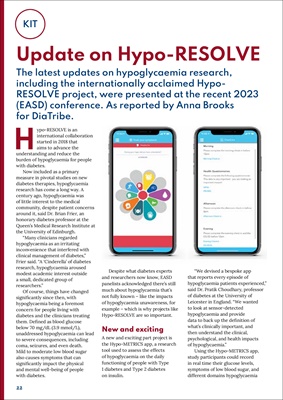
22KIT
Update on Hypo-RESOLVE
The latest updates on hypoglycaemia research,
including the internationally acclaimed HypoRESOLVE project,
were presented at the recent 2023
(EASD) conference. As reported by Anna Brooks
for DiaTribe.
Hypo-RESOLVE is an
international collaboration
started in 2018 that
aims to advance the
understanding and reduce the
burden of hypoglycaemia for people
with diabetes.
Now included as a primary
measure in pivotal studies on new
diabetes therapies, hypoglycaemia
research has come a long way. A
century ago, hypoglycaemia was
of little interest to the medical
community, despite patient concerns
around it, said Dr. Brian Frier, an
honorary diabetes professor at the
Queen's Medical Research Institute at
the University of Edinburgh.
"Many clinicians regarded
hypoglycaemia as an irritating
inconvenience that interfered with
clinical management of diabetes,"
Frier said. "A 'Cinderella' of diabetes
research, hypoglycaemia aroused
modest academic interest outside
a small, dedicated group of
researchers."
Of course, things have changed
significantly since then, with
hypoglycaemia being a foremost
concern for people living with
diabetes and the clinicians treating
them. Defined as blood glucose
below 70 mg/dL (3.9 mmol/L),
unaddressed hypoglycaemia can lead
to severe consequences, including
coma, seizures, and even death.
Mild to moderate low blood sugar
also causes symptoms that can
significantly impact the physical and
mental well-being of people with
diabetes.
Despite what diabetes experts
and researchers now know, EASD
panelists acknowledged there's still
much about hypoglycaemia that's
not fully known - like the impacts
of hypoglycaemia unawareness, for
example - which is why projects like
Hypo-RESOLVE are so important.
New and exciting
A new and exciting part project is
the Hypo-METRICS app, a research
tool used to assess the effects
of hypoglycaemia on the daily
functioning of people with Type
1 diabetes and Type 2 diabetes
on insulin.
"We devised a bespoke app
that reports every episode of
hypoglycaemia patients experienced,"
said Dr. Pratik Choudhary, professor
of diabetes at the University of
Leicester in England. "We wanted
to look at sensor-detected
hypoglycaemia and provide
data to back up the definition of
what's clinically important, and
then understand the clinical,
psychological, and health impacts
of hypoglycaemia."
Using the Hypo-METRICS app,
study participants could record
in real time their glucose levels,
symptoms of low blood sugar, and
different domains hypoglycaemia